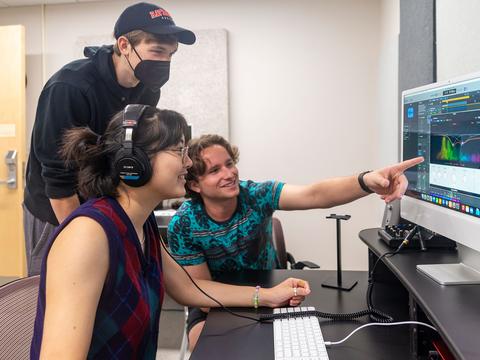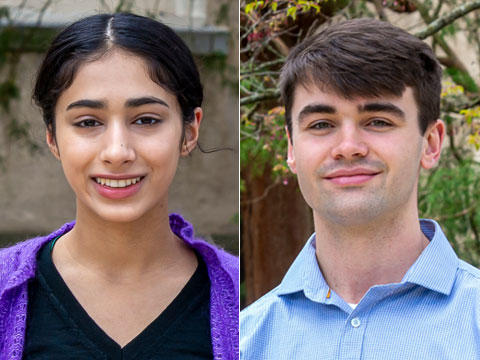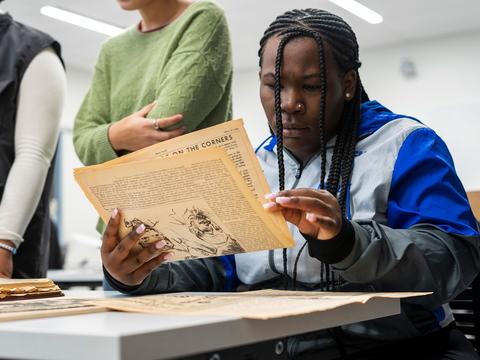Students Practice Peace-Building Throughout World
Details
This summer, Haverford students will be serving 10-week internships under the auspices of the Center for Peace and Global Citizenship, which supports study and outreach in areas related to peacemaking and peace-building, social, political and economic development, and governance challenges.
In previous years, the Center's interns studied Islamic sciences in the African village of Mauritania, acted as community mediators in New York City, examined conflict resolution in Northern Ireland, and assisted grassroots peace organizations in El Salvador. This year's internships are also geographically—and intellectually—diverse.
First-year student Claire Fawcett will travel to East London, South Africa, to study links between the AIDS epidemic and democracy in the country. She will work as a facilitator and data processor for an experiment on AIDS education, the“South African Adolescent Health Promotion Project.” A collaboration among the National Institutes of Health, the National Institutes of Mental Health, and the University of Pennsylvania, this experiment will focus on a number of high-risk Xhosa-speaking sixth grade students from 37 schools in Eastern Cape Province. Fawcett will assist with both of the project's educational programs: one that counsels a mixed group of English and Xhosa speakers on how to reduce their risk of HIV through safe sex, self-esteem and abstinence, and one that offers basic health education on HIV and AIDS prevention as well as other health concerns like cardiovascular disease and cancer.
Fawcett will also conduct her own research on AIDS and democracy through questionnaires and interviews.
Third-year student Diane Fruchtman hopes to help preserve multiculturalism and peace in Bosnia by working for International Forum Bosna, an organization that seeks to establish an international community based on an educated, cross-cultural dialogue about the Bosnian identity. Fruchtman will assist in the Forum's preparation of a three-week program of classes and public forums in which scholars and politicians will address the place of religion in public life.
Sophomore Jennie Gibson will travel to Mexico to intern with Fomcafé, which aids in the economic autonomy and development of indigenous Mexicans, specifically the Zapotec Indians in Naranjo Village. Fomcafé helps the villagers produce coffee that meets fair trade standards so they can sell the product at a better price. Gibson will teach the people theories of supply and demand and international trade, collaborate in a project involving savings banks and microcredit for groups of Naranjo women, and study the transactions and exchanges that take place in order for the production and export of fair trade coffee to occur.
In Las Vegas, sophomore David Langlieb will research various ways to help gambling addicts by participating in the Nevada Council on Problem Gambling. His activities will include visiting Gamblers Anonymous group meetings, consulting with University of Nevada-Las Vegas researchers and historians, attending the 17th National Conference on Problem Gambling, and helping to develop both the 6th Annual Responsible Gaming Education Week and the Nevada Helpline Outcome Survey, which reviews a 24-hour helpline providing information and referral services to gamblers and their families and friends.
Third-year student Caitlin Lockwood will study judicial reforms in Latin America the Justice Studies Center of the Americas (CEJA), in Santiago, Chile, an autonomous intergovernmental organization that helps Latin American countries with the judicial reform process.“Latin American countries are creating a wave of second generation reforms aimed at continuing the creation of solid, legitimate democratic institutions,” she says.“The work of CEJA could influence judicial reforms in African and Middle Eastern countries.”
Lockwood will work on a number of CEJA's projects. One will follow up on the judicial reforms of the penal systems taking place throughout the region. Another involves research sponsored by the Ford Foundation about the role of civil society in judicial reforms in Chile, Peru, Colombia, and Argentina. A third project, sponsored by USAID, will involve the compilation of statistics on the judicial systems of individual Latin American countries to help them improve the systems' organization. Lockwood will also attend a one-week course and several meetings of the Organization of American States (OAS) conference in Santiago.
Second-year student Sarah Morris and junior Kyle Smiddie will work at the Michigan Land Use Institute (MLUI) in Beulah, Mich., one of the country's largest state-based land use and environmental advocacy organizations. Founded by Keith Schneider, a former national environmental correspondent for The New York Times and a 1978 alumnus of Haverford, the Institute strives to achieve changes in public policy through investigative reporting and grassroots organizing. Morris and Smiddie will edit and write for the Institute's Web site, news services, and magazine, the Great Lakes Bulletin. They will also accompany the Institute's staff to legislative hearings and coalition meetings throughout Michigan, to learn how environmental policy decisions are made.
Sophomore Kate Reese will work with the Texas, Arkansas, Oklahoma Area Office of the American Friends Service Committee in Austin, Texas. She'll help with the office's“Democratizing the Global Economy” project, which seeks to organize and educate the U.S. population on issues of economic globalization and workers exploitation. Reese will research existing information on the Free Trade of the Americas, World Trade Organization, Intermonetary Fund and World Bank, and examine the deteriorating infrastructure of many Mexican border communities. Once compiled, her findings will be distributed throughout the Austin community and presented at workshops. As a participant in the Austin Tan Cerca de la Frontera Solidarity Delegations, she will also visit the homes and communities of border towns and help educate workers about their rights to representation.
Second-year student Elana Resnick is going to Sofia, Bulgaria where she hopes to help improve access to education combat segregation for Roma children in that war-torn country. As an intern with the Equal Access Foundation, Resnick will conduct research into the process of desegregation taking place in Bulgaria over the past two years, where 4.6 percent of Bulgaria's people identify as Roma, but do not receive adequate education nor the same opportunities as other citizens. She plans to study how education can be most beneficial to the preservation of linguistic and cultural rights and educational desegregation.
Anirudh Suri, a first-year student, will study different aspects of the nuclear conflict between Kashmir, India, and Pakistan, particularly its effects on the lives of Kashmir citizens, the efforts being undertaken to resolve the crisis, and possible paths to a resolution. Suri's internship will take him to the University of Illinois in Urbana-Champagne, where he will serve as a research assistant to scholars from India, Pakistan, and Bangladesh who are working on issues of nuclearization at the Arms Control, Disarmament, and International Security Center. Eventually he will travel to the Institute of Peace and Conflict Studies in New Delhi to work with Kashmir specialists and travel on to Kashmir itself, where he will assist a New Delhi-based women's rights organization in its humanitarian initiative, while learning about the effectiveness of NGOs and other citizens' initiatives in Kashmir.
Another intern, second-year student Niloufer Siddiqui, will also address women's rights in her home country of Pakistan, working for an organization dedicated to the empowerment of women in Pakistan society. Siddiqui will assist women who are having difficulty filing for divorce, and may help design workshops seeking harmony between the roles of men and women in the context of Pakistan's social milieu. She will also visit rural areas around the country, observing patriarchy at work and getting women's and men's views on a range of topics, such as family and society and the roles of culture and religion.



